 | |
| Location | Point Piedras Blancas San Simeon California United States |
|---|---|
| Coordinates | 35°39′56.3″N 121°17′03.6″W / 35.665639°N 121.284333°W |
| Tower | |
| Constructed | 1875 |
| Foundation | masonry basement |
| Construction | brick tower |
| Automated | 1975 |
| Height | 70 feet (21 m) |
| Shape | conical tower |
| Markings | white tower, black trim |
| Heritage | National Register of Historic Places listed place |
| Light | |
| Focal height | 142 feet (43 m) |
| Lens | First order Fresnel lens made by Henri Lapaute (original), VRB-25 (current) |
| Range | 21 nmi (39 km; 24 mi) |
| Characteristic | Fl W 10s. |
Piedras Blancas Light Station | |
| Nearest city | San Simeon, California |
| Area | 20 acres (8.1 ha) |
| Architectural style | Classical Revival, Gothic, Romanesque |
| MPS | Light Stations of California MPS |
| NRHP reference No. | 91001095[1] |
| Added to NRHP | September 03, 1991 |
Piedras Blancas Light Station is located at Point Piedras Blancas, about 5.5 miles (8.9 km) west by northwest of San Simeon, California.[2][3][4][5] It was added to the California Coastal National Monument in 2017.[6]
History and management

The first-order Fresnel lens at Piedras Blancas was first illuminated on February 15, 1875.[7] The Piedras Blancas lighthouse was originally 100 feet (30 m) high to the top of the ventilator ball, but earthquakes damaged the structure over the years. On December 31, 1948, final damage from an earthquake centered 6 miles (9.7 km) off the point led to the decision to remove the upper three floors: the fourth landing, watch room, and lantern. Missing the ornate upper floors, the truncated lighthouse now stands about 70 feet (21 m) tall. The lens was moved and is on display in the nearby community of Cambria.[8]
A sound signal was added in 1906.
In 1939, management was transferred from the United States Lighthouse Service to the United States Coast Guard. In 1975, the light was automated, the sound signal removed, and the light station was unmanned. A group of biologists with the U.S. Fish and Wildlife Service received permission to establish a biological research station in 1977. In 2001, the Bureau of Land Management (BLM) assumed management of the site and was tasked to offer structured public access, allow site-specific research to continue, and restore the light station to its period of greatest historical significance (1875 to 1940). The Piedras Blancas Light Station Association is a non-profit partner of the BLM, helping to raise funds for restoration and maintenance.
The lighthouse continues to serve as an aid to navigation. A Vega VRB-25 produces a flash every 10 seconds. The light station is managed as a historic park and wildlife sanctuary.
The Piedras Blancas Historic Light Station was designated as an Outstanding Natural Area in 2008.[9]
Access

Access to the 19-acre (7.7 ha) site is by guided tours, available every Tuesday, Thursday, and Saturday (except federal holidays) year round. From June 15 through August 31, tours are offered Mondays through Saturdays (except federal holidays). The fee is $10 for adults; $5 for ages 6 to 17; and free for ages 5 and under. Special tours for parties of 10 or more may be arranged. The tour lasts two hours and includes the historic lighthouse and support buildings, wildlife viewing, and spectacular scenery along an easy half-mile interpretive trail.
Elephant seal rookery and marine protected areas
The largest elephant seal rookery on the West Coast is located about a mile south of the lighthouse along California Highway One.[10] A few animals began using the rookery in 1990.[11] A large parking area and boardwalk offer easy access to view the elephant seals. Docents from Friends of the Elephant Seal provide insight as to what the visitor is viewing.[12] Open year-round.[13]
Piedras Blancas State Marine Reserve and Marine Conservation Area are marine protected areas offshore from Piedras Blancas Light Station. Like underwater parks, these marine protected areas help conserve ocean wildlife and marine ecosystems.[14][15]
In popular culture
The 1959 movie The Monster of Piedras Blancas was not shot at Point Piedras Blancas. The lighthouse locations in the movie were filmed at the Point Conception Light lighthouse near Lompoc, and the town is the seaside town of Cayucos, about 30 miles south of Piedras Blancas.
Gallery
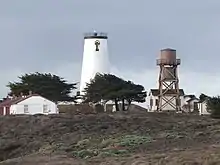 Piedras Blancas, 2014.
Piedras Blancas, 2014.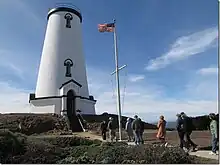 Tours of the Piedras Blancas Light Station are offered regularly.
Tours of the Piedras Blancas Light Station are offered regularly.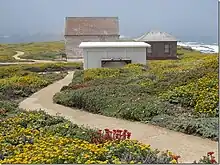 Native plants ablaze with color in early summer.
Native plants ablaze with color in early summer.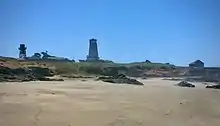 Piedras Blancas Light Station viewed from the beach below, May 2020
Piedras Blancas Light Station viewed from the beach below, May 2020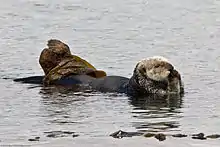 Sea otters rest and feed in the waters surrounding Piedras Blancas.
Sea otters rest and feed in the waters surrounding Piedras Blancas.
See also
- List of lighthouses in the United States
- Rancho Piedra Blanca, old Mexican land grant that included Point Piedras Blancas
- Piedras Blancas Motel, vintage roadside motel near the lighthouse
References
- ↑ "National Register Information System". National Register of Historic Places. National Park Service. March 13, 2009.
- ↑ Light List, Volume VI, Pacific Coast and Pacific Islands (PDF). Light List. United States Coast Guard. 2013. p. 3.
- ↑ "Historic Light Station Information and Photography: California". United States Coast Guard Historian's Office. Archived from the original on May 1, 2017.
- ↑ Rowlett, Russ. "Lighthouses of the United States: Central and Southern California". The Lighthouse Directory. University of North Carolina at Chapel Hill.
- ↑ NOAA chart #18700: Point Conception to Point Sur, 1/216116, 2003
- ↑ Boxall, Bettina (January 13, 2017). "Obama adds six sites to California Coastal National Monument". Los Angeles Times. Retrieved December 21, 2022.
- ↑ "Historical Mements: Piedras Blancas Lighthouse". Cambria Historical Society. Archived from the original on March 17, 2016. Retrieved January 30, 2016.
- ↑ "Cambria Historical Society: Historical notes". Archived from the original on April 18, 2009.
Piedras Blancas Lighthouse Lens
- ↑ The Consolidated Natural Resources Act of 2008 (Pub. L. 110–229 (text) (PDF), 122 Stat. 754-876, enacted May 8, 2008)
- ↑ Crumley, Bruce (March 2, 2022). "Cal Poly students learn drone piloting for elephant seal census". DroneDJ. Retrieved March 2, 2022.
- ↑ Graham, Chuck (May 18, 2022). "San Simeon's Rookery on the Rise". The Santa Barbara Independent. Retrieved June 19, 2022.
- ↑ "Friends of the Elephant Seal | Piedras Blancas Northern Elephant Seal Rookery". elephantseal.org. Retrieved March 2, 2022.
- ↑ Heinrichs, Christine (December 21, 2022). "Welcome back, bulls! Male elephant seals return to SLO County rookery". The Tribune (San Luis Obispo).
- ↑ Strickland, Tonya (September 18, 2015). "Bill would add Piedras Blancas Light Station to California Coastal National Monument". The Tribune (San Luis Obispo). Archived from the original on September 19, 2015. Retrieved September 21, 2015.
- ↑ Clark, Samantha (September 18, 2015). "Bill would include Coast Dairies in California Coastal National Monument". Santa Cruz Sentinel.
Further reading
- Point Piedras Blancas, by Carole Adams & John Bogacki. 2008, Arcadia "Images of America" series. ISBN 978-0738558196
External links
- Piedras Blancas Light Station Outstanding Natural Area, Bureau of Land Management
- Piedras Blancas Light Station Association
.jpg.webp)
